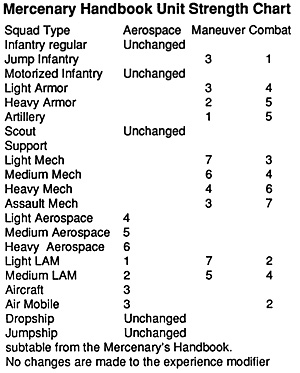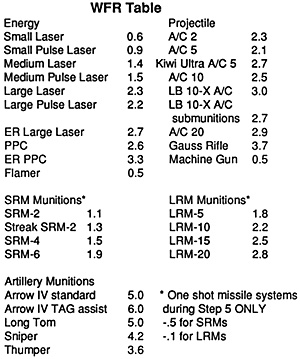As technology advances so do the training programs associated with them. Not fully ten years ago I published The Star Simulator Ratings system. Since then we have gradually enhanced and modified it to keep up with the military and technological changes of the Inner Sphere.
Normally it is after yearsof testing that we release the highly classified training simulators to the public. Yet with this new barely understood threat to the Innersphere, Prince Davion has authorized NAIS to release the full simulator system to anyone who wishes to prepare themselves. Despite dismayed protests from many of my colleagues I think his Highness is quite correct that any information that can save a life or planet should no longer be hidden.
As more information comes in on the forces known as the "Clans" we at the Tactics department of NAIS promise to update the simulator systems and send any one asking a full computer simulation system.
What follows is the current written information on the Federated Commonwealth Star Simulator system, including the before unreleased Conventional Armor simulator data used at NAIS and NAMA for decades and now at all training centers across the F-C. To all warriors across the Inner Sphere, God speed and may Kerensky's luck be with you.
Notes
# 1 Some BattleMechs are designed for specific missions, or for operations in specific terrain. Example: both the UrbanMech and the Hatchetman are city fighting 'Mech. When a BattleMech is operating in such a specific environment, add 5.0 to the CEF. When it it operating outside of it, the gamemaster may choose an appropriate negative modifier. Example: in open terrain where speed and long-range firepower are major factors, the UrbanMech especially will be at a serious minus. This only applies to 'Mechs which are designed with such a specialty in mind.
SEFR Table
Item : Rating Additions
Anti-Missile System : Add .5 per ton of ammo
Artemis IV System : Add .2 to all missile WFR
Beagle Active Probe : Add .5
Built-in Hatchet/Club : Add 1/2 DFR
CASE : Add .5 per CASE system
C3 Targeting Computer : Add 4 to CEF (use only when running multi
'Mech battles)
Dual Combat Cockpit : Add .7
Ferro-Fibrous Armor : Add armor tonnage Multiplied by .12
Guardian ECM Suite : Add .5
LAM Conversion Gear : Add .3
MASC : Add 1/2 'Mech Walking MP
NARC Missile Beacon : Add .4 to all missile WFR
Swarm LRM Rounds : Add .2 to missile WFR
Target Acquisition Gear : Add .5
DFR Table
Tonnage : Rating
15 : 3
20 : 4
25 : 5
30 : 6
35 : 7
40 : 8
45 : 9
50 : 10
55 : 11
60 : 12
65 : 13
70 : 14
75 : 15
80 : 16
85 : 17
90 : 18
95 : 19
100 : 20
 # 2: Many mercenary units use the famed
Mercenary's Handbook (FASA Corporation) when
preparing a mission. They use the tactical tables to
determine percentage chances of success on any
given mission. As BattleMechs and units in 3050
outperformtheir 3025 counterparts, use the added
Unit Strength Chart presented here to calculate Star
League Vehicles' superior operational capabilities.
# 2: Many mercenary units use the famed
Mercenary's Handbook (FASA Corporation) when
preparing a mission. They use the tactical tables to
determine percentage chances of success on any
given mission. As BattleMechs and units in 3050
outperformtheir 3025 counterparts, use the added
Unit Strength Chart presented here to calculate Star
League Vehicles' superior operational capabilities.
 # 3: By observing simulation curves and the
performance of certain weapons we havecometothe
realization that some weapons limited short range
ability is a deciding factor in simulations
As such a new Weapons Factor Rating Chart is
provided. Please observe the changes in all
weapons with listed minimum range in the
BattleTech Compendium.
# 3: By observing simulation curves and the
performance of certain weapons we havecometothe
realization that some weapons limited short range
ability is a deciding factor in simulations
As such a new Weapons Factor Rating Chart is
provided. Please observe the changes in all
weapons with listed minimum range in the
BattleTech Compendium.
To calculate the Combat Efficiency Factor of a BattleMech
you'll need a comp pad, Rating tables, and the performance specs for the 'Mech.
Step 1: Divide tonnage by 10 - Record
Step 2: Record armor tonnage - If using Ferro-Fibrous armor, see SEFR table entry # 7
Step 3: Record walking MPs - If equipped with MASC unit, see SEFR table entry # 5
Step 4: Add .75 for each jump jet
Step 5: Calculate Weapons Factor Rating and record
Step 6: Calculate Safe Weapons Factor Rating - Use WFR Table to calculate the most efficient use of "Mechs weapons short of overheating - record.
Step 7: If after Safe WFR is calculated one or more heat sinks remain unused, add 1.0
Step8: Calculate Hand to Hand Damage Facto r- record - Use DFR Table
Step 9: Calculate Special Equipment Factor Rating record - Use SEFR Table to add points for special equipment
Step 10: Total steps 1-9 to determine CEF.
To Calculate Combat Efficiency Factor for Infantry
Follow the listed s
Step 1: Record movement
2: It Jump capable add 1
Step 3: Calculate Terrain Propulsion Rating - Use TPR table
Step 4: Divide number of men in the unit by 10. Record.
Step 5: Record Infantry Platoons Maximum damage as listed in BATTLETECH Compendium - (this includes 1 heavy weapon per squad)
Step5A: Add Infantry WFR for all heavy weapons in unit to Step 5 result. - Use I-WFR table, Remember a trooper can carry one primary weapon so subtract the WFR of the weapon he gives up (A rifleman is given a heavy flamer, theWFRforthe heavy weapon is .9 [1.0 -.1 =.9])
Step 6: Take results of Step 5 and 5A and divide by 10, Record
Step 7: If infantry has had Anti-'Mech training, add 3. Step 8: Add Steps 1-5 to determine CEF
I-WFR table
Individual Weapons
Rifle 0.1
Flamer 0.2
Flamer,Heavy 0.6
Laser Rifle (Portable) 0.3
Laser, Semi Port 0.5
Laser, Semi Port Heavy 0.7
MG, Portable 0.2
MG, Semi Port 0.5
MG, Support 0.7
Mortar, Heavy 1.0
Mortar, Light 0.7
PPC, Man Pack 0.7
PPC, Semi Port 1.0
Recoilless, Heavy 1.0
Recoilless, Medium 0.7
Recoilless, Light 0.3
SRM Regular 0.3
SRM, Heavy 0.4
Grenade, Auto 0.2
GyroJet Rifle, Heavy 0.3
LAW 0.2
Portable Rocket Launcher 0.3
Note: Unless an elite or special duty unit, infantry will not carry more than on heavier weapon per squad.
Terrain Propulsion Rating Table
Wheeled .3
Tracked .6
Hover .6
VTOL .8
Surface Naval .1
Submarines .2
Infantry .2
Mechanized .2
Jump .3
To calculate Aerospace Combat Efficiency Factor
Follow the listed steps
Step 1: Divide Tonnage by 10, Record
Step 1A: If Conventional Fighter divide by 15
Step 2: Record armor tonnage If using Ferro-Fibrous armor see SEFR table
Step 3: Record Thrust rating
Step 4: Calculate Weapon Factor Rating
Step 5: Calculate Safe Weapon Factor Rating -Calculate most efficient use WFR without over heating
Step 5a: If Conventional Fighter divide Step 5 by 2, Record
Step 6: If after Safe WFR is calculated there are heatsinks unused add 1 for each up the difference between thrust and overthrust - example, a Thrust 6 Overthrust 9 fighter has 4 Heatsinks unused after Safe WFR. It would add 3 to its CEF (9-6=3)
Step 6a: Ignore this step if Conventional Fighter
Step 7: Calculate Special Equipment Factor Rating, Record - Use SEFR table
Step 8: Add Steps 1-7 to determine CEF
BattleMechanics
Back to BattleTechnology 16 Table of Contents
Back to BattleTechnology List of Issues
Back to MagWeb Magazine List
© Copyright 1992 by Pacific Rim Publishing.
This article appears in MagWeb.com (Magazine Web) on the Internet World Wide Web.
Other military history articles and gaming articles are available at http://www.magweb.com